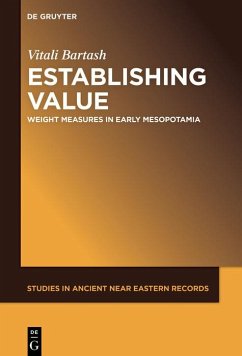This book explores the reasons for which weights and scales were used to measure goods in Early Mesopotamia (ca. 3,200-2,000 BCE). The vast corpus of cuneiform records from this period sheds light on the various mechanisms behind the development of this cultural innovation. Weighing became the means of articulating the value of both imported and locally-produced goods within a socioeconomic system that had reached an unprecedented level of complexity. This study provides a comprehensive analysis of this cultural and economic phenomenon, which simultaneously reflected and shaped the relationships between individuals and groups in Mesopotamia throughout the third millennium BCE.
Dieser Download kann aus rechtlichen Gründen nur mit Rechnungsadresse in A, B, BG, CY, CZ, D, DK, EW, E, FIN, F, GR, HR, H, IRL, I, LT, L, LR, M, NL, PL, P, R, S, SLO, SK ausgeliefert werden.


